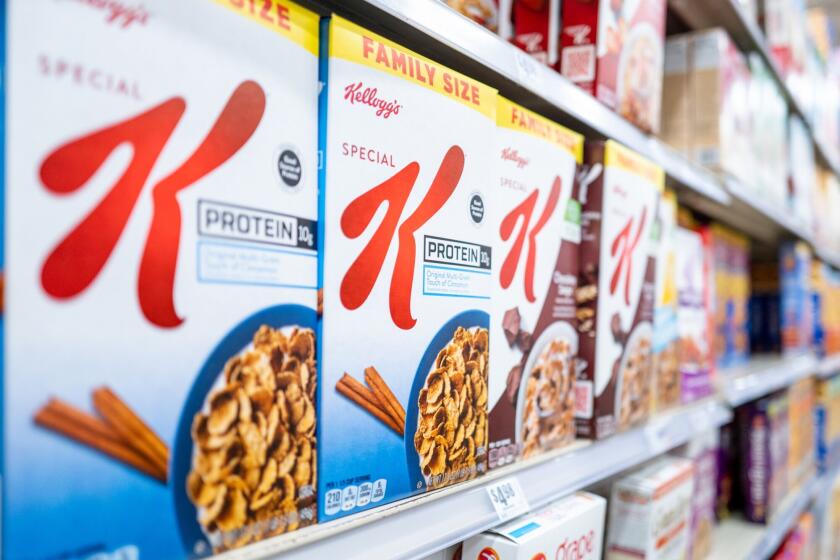Russia in Game of Chicken Over U.S. Imports
- Share via
MOSCOW — High-level diplomacy was powerless to stop it. Political logic and public opinion were never taken into account. Even the natural urge to avoid looking silly failed to avert Saturday’s outbreak of the Great Chicken War.
Russia has banned all imports of U.S. poultry with dubious claims that the Western birds fail to measure up to Russian sanitary conditions.
In a country where consumers long shunned the domestic version, dubbed “blue birds” for their unappetizing color, the move to close this massive market to U.S. exporters smacks of election-year protectionism.
But there’s more at stake in this battle over broilers and plump leg quarters than control of a thriving market.
The fowl fiasco between the former Cold War rivals and how it is eventually resolved could prove a bellwether of the very future of Russia.
It could backfire on President Boris N. Yeltsin in his thinly veiled effort to appear the patriotic protector of Russians’ health and the domestic poultry industry, as consumers may soon find that their skinny local chickens cost more than their fat American cousins.
Even more disruptive of the new world order, a protracted ban could upset the current global balance between white meat and dark.
The $500-million annual market for U.S. chicken parts in Russia used to be considered a success story in bilateral trade relations. Because American consumers tend to buy more breasts and wings than leg quarters, the Russian preference for dark meat gave U.S. poultry giants a welcome market for the remnants.
Chicken was never very popular among Russians in the Soviet era, when inefficient transportation and poor refrigeration often meant the birds were spoiled or desiccated before they got to market. Indifferent government butchers also left the feet on, adding little to their appeal.
*
Russians’ penchant for poultry grew after then-U.S. President Bush sent tons of dark-meat pieces here as food aid in 1991, giving the popular American hindquarters a name they retain to this day: “Bush legs.”
Agriculture was problematic even in the Soviet era, and the domestic industry has deteriorated in recent years as the old network for fuel and feed distribution collapsed with the Communist empire. Russia last year suffered its worst grain harvest in a generation.
Under pressure from political rivals who have accused Yeltsin and his government of ceding food markets to foreign vendors, the Agriculture Ministry has been lobbying for imposition of a 20% poultry import tariff. It has also seized on U.S. Department of Agriculture figures reporting 3,000 deaths and millions of cases of food poisoning from diseased meat and poultry among Americans each year.
Russia’s chief agricultural veterinarian, Vyachislav Avilov, suspended the issuance of poultry import licenses to U.S. producers on Feb. 16 and gave Washington a month to take action to ensure American chickens exported to Russia were not contaminated by salmonella.
U.S. Vice President Al Gore intervened earlier this month, urging Russian Prime Minister Viktor S. Chernomyrdin to refrain from launching a chicken trade war that U.S. suppliers would consider protectionism.
Chernomyrdin assured Gore that no ban would be imposed if the U.S. government ensured quality exports. But USDA documents sent to Moscow failed to fully satisfy the Russians, and Deputy Prime Minister Alexander K. Zaveryukha announced Saturday that all U.S. poultry imports have been suspended.
In Washington, the State Department said it had no comment on the decision.
*
In a report by Russian state television, officials conceded that the production costs for domestic poultry per kilogram are already 50% higher than the same amount of processed, packaged and delivered American product. The broadcast blamed the imbalance on what it said were higher U.S. government subsidies to farmers.
“If this is allowed to continue, Russian poultry products will simply cease to exist,” complained Alexander N. Tkachev, a parliamentary deputy from the poultry-producing region of Krasnodar.
While the death of the Russian industry would further burden struggling farmers, stifling U.S. competition will mean higher poultry prices for consumers.
And in an election year when pocketbook issues are paramount, Yeltsin’s chances of winning a second term could just as soon be harmed by consumer outrage over rising chicken prices as helped by questionable claims to be saving farms and providing a more sanitary product.
A key debate ahead of the June presidential election in which Yeltsin is challenged by Communist Party leader Gennady A. Zyuganov is whether Russians want a return to the state controls that ensured jobs and stable prices but often at the expense of quality and supply.
If Yeltsin further alienates Russian consumers by replacing “Bush legs” with costlier “blue birds,” he could lose the game of political chicken.
More to Read
Inside the business of entertainment
The Wide Shot brings you news, analysis and insights on everything from streaming wars to production — and what it all means for the future.
You may occasionally receive promotional content from the Los Angeles Times.











